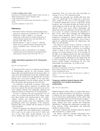Search
forProducts matching "moderate hair loss"
Tracking 6 products like 150 Brintop F Topical Solution, 155 Dutagen 0.5mg, 161 Finax, 163 Prosteride and 163 Prosteride from by companies like Inhouse Pharmacy and ZeeMoreUncle. View all 6 products »
Sort by
Research
990-1000 / 1000+ results
research Alterations in Androgen Conjugate Levels in Women and Men with Alopecia
Women with hair loss have higher androgen levels, while men with early balding have altered androgen ratios.

research Permanent Alopecia After Systemic Chemotherapy: A Clinicopathological Study of 10 Cases
Chemotherapy can cause permanent, non-reversible hair loss similar to pattern baldness.

research Gender-Specific Association of Androgenetic Alopecia with Metabolic Syndrome in a Middle-Aged Korean Population
Female hair loss linked to metabolic syndrome, not in males.

research Is Seborrhoeic Dermatitis Associated with Diffuse, Low-Grade Folliculitis and Progressive Cicatricial Alopecia?
Seborrhoeic dermatitis may cause a condition called "seborrhoeic folliculitis," leading to chronic scalp inflammation and scarring hair loss.

research Central Centrifugal Cicatricial Alopecia: Possible Familial Aetiology in Two African Families from South Africa
The conclusion is that hair loss from CCCA may be genetic and not solely caused by hair grooming practices.

research Temporary Radiation-Induced Alopecia After Embolization of a Cerebral Arteriovenous Malformation
Temporary hair loss can occur after brain AVM treatment but usually regrows in 8 weeks.

research Triglyceridemia in Conditions of Food Stress in Women with Polycystic Ovary Syndrome and Androgenic Alopecia
Women with PCOS and androgenic alopecia have different triglyceride metabolism compared to those without hair loss.

research Dermatopathology Workshop Summary, Berlin 2004
The workshop aimed to improve hair loss disorder diagnosis and understanding.

research The Hair Follicle as an Estrogen Target and Source
Estrogens significantly influence hair growth by interacting with receptors in hair follicles and may help regulate the hair growth cycle.